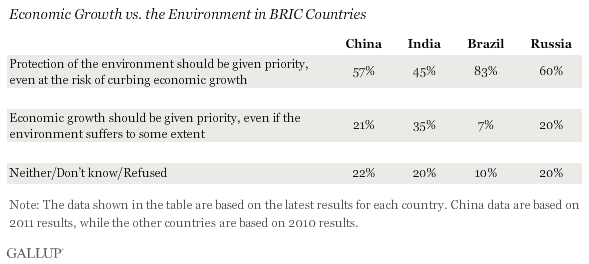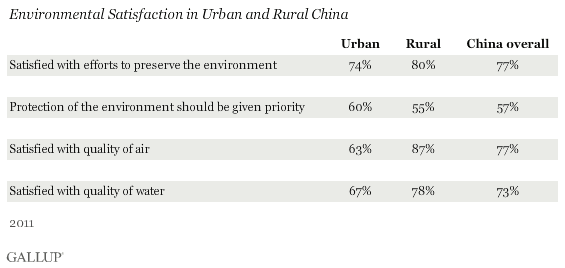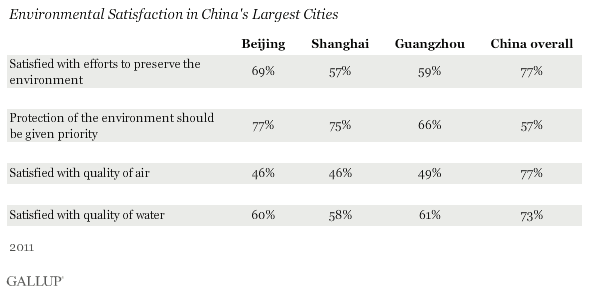WASHINGTON, D.C. -- Fifty-seven percent of Chinese adults surveyed in 2011 -- before the country's economic slowdown grabbed headlines -- prioritized protecting the environment, even at the risk of curbing economic growth. About one in five believed economic growth is more important. Chinese attitudes are typical of those in other emerging-market economies, where residents sided with the environment over the economy in earlier surveys.

Similarly, Americans historically prioritized environment protection over economic growth from 1985 to 2008. However, economic growth has taken priority since the economic recession deepened in 2009. If China's economic troubles worsen, residents' attitudes could change too.
Among the 22% of Chinese who did not choose the environment or the economy, about half of them (12%) answered they don't know. Those who did not have an opinion tended to be poor rural residents with no education beyond elementary school, perhaps indicating their lack of awareness about environmental issues. The 9% who answered neither tended to be wealthy urban residents with high education. For them, it might be a dilemma of choosing one over the other because both the economy and the environment are extremely important.
More Environmental Challenges Lie in Urban Areas
More than three in four (77%) Chinese are satisfied with current efforts to preserve the environment. Residents living in the urban areas, the hub of much of China's industrial activity, however, are significantly less satisfied than their rural counterparts with these efforts, as well as the quality of the air and water where they live. With good reason: The World Health Organization finds air pollution in Shanghai and Beijing is double or even triple the severity it is in London or Los Angeles. Further, China's Ministry of Environmental Protection finds groundwater at 57% of its monitoring sites in cities is polluted or extremely polluted.

The enormity of China's challenges as it attempts to balance rapid urbanization, industrial growth, and environmental concerns is even more apparent in its largest cities. In Shanghai, Beijing, and Guangzhou, residents' satisfaction with the efforts to preserve the environment as well as the quality of air and water significantly trails the national average. Consequently, residents are more likely to say that priority should be given to protecting the environment, even if it risks economic growth.

Implications
China still lags behind developed countries in terms of efforts to protect the environment. At the same time, it is investing heavily in new energy sources and low-carbon technologies that could satisfy the substantial power demand from rapid urbanization while protecting the environment and reducing overreliance on coal.
Without aggressive strategies to combat pollution, China's environmental problems will likely only worsen as its urban areas continue to expand. Comprehensive urbanization policies that focus on conservation and the efficient use of natural resources such as energy, air, water, and land will be necessary to ensure the sustainability and quality of these resources in the future. On a regional level, cities such as Qingdao, Tianjin, and Shenyang are emerging as role models for urban economic and environmental development. They have all have shown leadership in developing best practices in successful green urban planning.
For complete data sets or custom research from the more than 150 countries Gallup continually surveys, please contact SocialandEconomicAnalysis@gallup.com or call 202.715.3030.
Survey Methods
Results in China are based on face-to-face and telephone interviews with approximately 4,200 adults in 2011. In 2010, the results are based on face-to-face interviews with approximately 1,000 adults in Brazil, 2,000 adults in Russia, and 6,000 adults in India. For results based on the total sample of national adults, one can say with 95% confidence that the maximum margin of sampling error in 2011 ranged from ± 2.0 percentage points to ±3.5 percentage points.
For more complete methodology and specific survey dates, please review Gallup's Country Data Set details.
